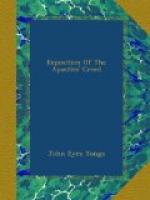It does not necessarily follow, even if the information was supplied by Mary, that it is therefore to be accepted as true. Human witnesses are not infallible or invariably honest, and it is conceivable that Mary may have been a dreamer or a deceiver. This article of the Creed, contradicting as it does the ordinary course of nature, stands in need of more than a historic statement. Jesus admitted that if His claims had been supported by no other evidence than His own word, the Jews would have had excuse for hesitating to accept Him. “If,” said He, “I bear witness of myself, my witness is not true,"[078] and therefore He appealed to the testimony borne to His Messiahship by His Father, by John the Baptist, by His miracles, and by His life. All the evidence by which the Divine nature and mission of Jesus were accredited goes to support the account of His super natural birth.
That Jesus was born of Mary is a plain historic truth to which all must accord belief. “Yes,” said Renan, who did not regard Christ as the Son of God, “this story of Jesus is no fable, but a true history Christ really lived.” The miraculous birth was a fulfilment of prophecy. When the angel told Mary that the child to be born of her would be the Son of God, he cited Isaiah’s prophecy for the confirmation of her faith, and indeed the same truth had been foreshadowed when the promise was given to Eve that her seed should bruise the head of the serpent. The first Adam had no human father. He was the Son of God. It was therefore fitting that the second Adam should resemble the first in this respect, being in a sense infinitely higher than our first father the Son of God, His only Son. It was fitting too that He who was to assume the nature, not of any branch of the human family but of universal man, should be conceived by the Holy Ghost. Other faiths than Christianity are limited in their adaptation to races. The religion of Mahomet is not practicable save in Eastern latitudes. The Koran enjoins as




